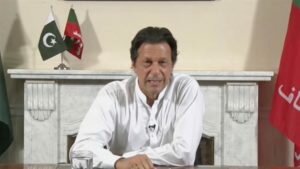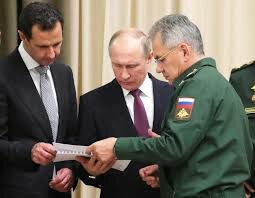
Andrew Koryko gave an interview to the Iranian newspaper “Kayhan” about the latest US-provoked tensions in the Gulf, with the main takeaway being that Iran must choose its battles in the Mashriq wisely in order to avoid being overwhelmed by the containment coalition that’s assembling to confront it, as well as seriously consider a full-fledged eastern pivot towards Pakistan and its Chinese ally as the most viable form of Hybrid War relief. Below is the exclusive English language version of the full interview.
- Given the escalating political tensions between the US and Iran, what’s the possibility of a US-led war breaking out in the region?
The US, especially under Trump, is very unpredictable and it’s difficult to tell what it’ll do next, yet it seems unlikely that it’ll trigger a major war in the Mideast, especially ahead of the 2020 elections. By all indications, it’ll be a heated race and Trump needs to be careful not to do anything that can ruin his re-election prospects, such as starting a costly war and consequently causing a spike in the oil price. Nevertheless, he isn’t in full control of his government, so it’s possible that “rogue” elements of his permanent military, intelligence, and diplomatic bureaucracies (“deep state”) might stage a false flag attack in order to trap him in a situation where he’s forced to respond, exactly like what happened early on in his presidency with the false flag chemical weapons attack in Syria and the subsequent cruise missile barrage that he felt pressured to fire in order to “save face”.
In that scenario, Trump would probably respond to any anti-Iranian false flag in a similar way (“surgical strikes”) if he undertakes a forceful response at all, but Iran isn’t Syria and probably won’t take the attack lying down without a reciprocal response. Furthermore, the US’ Gulf allies might also unilaterally respond to any false flag that takes place on their territories without coordinating it with Trump, potentially triggering a wider conflict because Iran might feel compelled to respond to them too in order to “save face”. Altogether, while there’s a credible risk of Trump’s “deep state” possibly planning a false flag attack that could quickly spiral out of control (which would be the whole point), it doesn’t seem like the American leader himself wants this to happen because it would be counterproductive for his domestic political interests, even if he’s powerless to stop it.
- Trump does not have a stable character, so can Iranians trust him again even though he abandoned the previous deal already?
Trust is irrelevant in International Relations, at least according to the Neo-Realist school of thought, since all that matters first and foremost are interests. In addition, Trump isn’t in full control of his government because some “deep state” factions still wield tremendous power and influence. In any case, the decision to pull out of the nuclear deal was certainly made by Trump himself since he’s spoken about it multiple times in the past and especially during the election campaign. It’s not so much that Trump isn’t stable, it’s that a certain faction of the Obama-era “deep state” strongly felt that the agreement went against America’s interests.
To explain, Obama signed the deal as part of a “detente” with Iran, but it wasn’t sincere. The ruling “deep state” faction at the time wanted to lower Iran’s guard and quietly infiltrate the country by making it dependent on the US and its Western allies after it “integrated” into the global economy. Concurrent with this, the US was planning to do the exact same thing to Iran as it did to Syria in the run-up to the so-called “Arab Spring”, which is exploit the government’s “opening up” in order to silently spread its influence among the country’s people prior to manufacturing a trigger event that could provoke them into taking up arms against the state.
As is now known, that aforesaid trigger event was the end of the nuclear deal, which happened a lot sooner than expected because the pro-Trump “deep state” faction prioritized pulling out of this agreement before all of the intelligence and influence networks were properly established within Iran. That’s because they felt like Iran could take advantage of the “detente” in order to strengthen its internal defenses against this impending Hybrid War onslaught. They also didn’t like the optics of the US unfreezing tens of billions of dollars’ of Iran’s seized financial assets because they feared that it could redirect these funds to Damascus, Hezbollah, and the Houthis. Against this backdrop, it was entirely predictable that Trump would pull out of the nuclear deal.
Going forward, Iran shouldn’t expect to be an equal partner in any negotiations with the US. The only thing that Washington wants is for Tehran to negotiate its strategic surrender and junior role in America’s envisaged “New Middle East”. That’s not to say that participating in these talks wouldn’t be pragmatic if it buys time or ensures even minimal token concessions from the US, but just that Trump has all the economic, political, and military leverage to not have to give anything up without receiving something serious from Iran in return. Again, this isn’t because he’s unstable, but because the US doesn’t have any interest in behaving otherwise.
- How do you assess the Europeans’ compliance to JCPOA and how much have they fulfilled their promises?
Iran shouldn’t get its hopes up thinking that the Europeans will respect the JCPOA and defy the US since America can just impose so-called “secondary sanctions” against all those countries and entities that defy its will. The US and EU are major trading partners, and as such, the bloc is very vulnerable to the economic warfare being waged by Trump. This makes it extremely unlikely that any European “workaround” would be robust enough to make a difference because the EU simply can’t afford the economic consequences of going against the US’ will. Instead, it’s putting on a positive face and pretending to be interested in abiding by the terms of the deal, all while doing the opposite in practice. This suggests that the US and its NATO allies are playing a game of “bad cop, good cop” to manipulate Iran and confuse its leadership, all while America intensifies its Hybrid War against the country.
- How should we respond to the West’s disloyalty?
Iran should first and foremost accept that the West wasn’t being “disloyal”, it’s just that Trump’s unexpected election drastically sped up the process of the US’ withdrawal from the nuclear deal, after which it threatened its EU allies to reduce their commitment to it prior to their de-facto withdrawal as well (albeit under serious pressure). The Europeans seem to have had every intention of respecting the agreement, but they’re powerless in the face of the US’ “secondary sanctions” threats and are therefore resorting to high-sounding rhetoric about “international law” in order to mask their actions of going along with America in practice. This has nothing to do with “loyalty” and “trust” and everything to do with cold, hard, geopolitical interests as understood by the Neo-Realist school of thought in International Relations.
Only once this geopolitical logic is accepted and all emotional interpretations are discredited can Iran begin preparing a suitable response to what happened. The fact of the matter is that the US is silently assembling a multinational coalition to “contain” Iran and push back against its growing influence in the “Mashriq”. This unofficial bloc includes the Gulf Kingdoms, ““, and the EU, and it’ll resort to a multifuncitonal approach in pursuit of its US leader’s interests. The EU fulfills the economic component of putting intensified pressure on Iran, while the Gulf Kingdoms play a frontline military role. “Israel”, for its part, complements the US’ behind-the-scenes influence operations and helps coordinate the actions of this entire coalition, especially its Mideast members. The resultant Hybrid War that’s being waged therefore poses a serious challenge to Iran.
The answer is obviously not to capitulate, but also not to unwisely fight along unwinnable fronts either just for principle’s sake. What’s meant by this is that Iran should realize that the US-led Hybrid War coalition is beginning to impose enormous costs on maintaining the country’s influence in the “Mashriq”, making it very unlikely that Iran will be able to expand its influence there. Instead, it should focus on fortifying its established gains and preparing for a long-term defensive campaign to protect its interests there. This might even include making superficial concessions such as initiating the dignified but “phased withdrawal” of its forces from Syria in exchange for partial sanctions relief, seeing as how the kinetic phase of the conflict there is practically over and the war is entering a new, mostly political phase where its troops are no longer as necessary as before.
A purely defensive policy won’t be sufficient to safeguard Iran’s state interests, however, which is why it must begin proactively probing the possibility of strengthening the emerging Golden Ring of Multipolar Great Powers between itself, Pakistan, China, Russia, and Turkey, with a specific focus on the “Multipolar CENTO” of itself, Pakistan, and Turkey as a stabilizing belt of Muslim Great Powers along the South Eurasian Rimland. A bevy of bilateral issues still exist in Iranian-Pakistani relations which could make this difficult to implement, but the recently created joint border force between the two should go a long way towards building trust and improving relations so that this can become politically feasible. Iran’s “Eastern Pivot”, with a specific focus on Pakistan, will be integral to surviving the oncoming Hybrid War onslaught and should therefore be urgently prioritized.
- What is the proper prescription for our bad economy condition?
The only credible chance that Iran has of alleviating its economic woes is to reorient its strategic focus eastward towards the countries of the Golden Ring. The country needs to wholeheartedly commit to China’s Belt & Road Initiative (BRI) and provide enticing incentives for Russian companies to defy the US’ “secondary sanctions” threats. This is easier said than done in both interconnected instances and will take time to reap tangible dividends in any case, but progress must immediately be made on these fronts in order to lighten the blow of the US’ economic warfare against Iran. Even so, it can’t be ignored that this solution risks going awry and creating a scenario whereby a possible Russian-Chinese economic duopoly over Iran is leveraged by either of those two Great Powers as a bargaining chip for improving their individual relations with the US, so decision makers need to be aware of this possibility and incorporate it into their cost-benefit calculations.
DISCLAIMER: The author writes for this publication in a private capacity which is unrepresentative of anyone or any organization except for his own personal views. Nothing written by the author should ever be conflated with the editorial views or official positions of any other media outlet or institution.





